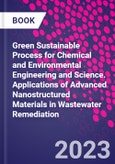Green Sustainable Process for Chemical and Environmental Engineering and Science: Applications of Advanced Nanostructured Materials in Wastewater Remediation reviews recent applications of nanostructured materials for remediation, their preparation, characterization and efficiency for water remediation technologies. The book provides ideas on how nanomaterials are the real solution to water purification or new environmental threat. Sections cover nanomaterial adsorbents, functionalized magnetic nanomaterials, nanostructured polymer hydrogels, carbon nanomaterials, biogenic nanoparticles, green chemistry concepts, aqua defluoridation and advanced remediation techniques.
The book also includes the current status of wastewater treatment using nanomaterials, along with challenges and perspectives for further improvements.
Please Note: This is an On Demand product, delivery may take up to 11 working days after payment has been received.
Table of Contents
1. Pollutant remediation from water using polymeric nanocomposites having chitosan, poly(vinyl alcohol) and nanofillers2. Graphene and graphene oxide nanomaterials for heavy metals removal
3. Applications of engineered magnetite nanoparticles for water pollutants removal
4. Purification of water by use of hydrogels
5. Recoverable and regenerable magnetite-based nanocomposites adsorbents for heavy metals removal in contaminated water
6. Carbon nanostructures: next generation materials for water purification
7. Carbon quantum dots: a fluorescent miniature with huge impact on environmental remediation
8. Removal of organic dyes by functionalized nanomaterials
9. Reactive Metal Oxides in Ceramic Membrane Formulation as A Clue to Effective Point-Of-Use Drinking Water Defluoridation
10. Application of nanoengineered materials from beneficial microorganism for the bioremediation of polluted soil
11. Application of nanomaterials for the remediation of poly and perfluoroalkyl substances: Recent progress and challenges. Critical review
12. Recent developments in biogenic synthesis of nanomaterials for different applications: A pre-eminent approach towards green nanotechnology
13. Synthesis of nano-structured materials by green methods
Authors
Tariq Altalhi Department of Chemistry, College of Science, Taif University, Taif, Saudi Arabia.Dr. Tariq Altalhi is working as an associate professor at the Department of Chemistry, College of Science, Taif University, Taif, Saudi Arabia. He has coedited various scientific books. He has established key contacts with major industries in the Kingdom of Saudi Arabia.
Mohammad Abu Jafar Mazumder Chemistry Department, and Interdisciplinary Research Center for Advanced Materials, King Fahd University of Petroleum and Minerals, Dhahran, Saudi Arabia. Mohammad Abu Jafar Mazumder works in the Chemistry Department, and Interdisciplinary Research Center for Advanced Materials at King Fahd University of Petroleum and Minerals in Dhahran, Saudi Arabia. Inamuddin Assistant Professor, Department of Applied Chemistry, Zakir Husain College of Engineering and Technology, Faculty of Engineering and Technology, Aligarh Muslim University, Aligarh, India.Dr. Inamuddin is an Assistant Professor at the Department of Applied Chemistry at the Zakir Husain College of Engineering and Technology, Aligarh Muslim University, Aligarh, India. He has extensive research experience in multidisciplinary fields of analytical chemistry, materials chemistry, electrochemistry, renewable energy, and environmental science. He has worked on different research projects funded by various government agencies and universities and is the recipient of several awards, including the Fast Track Young Scientist Award and the Young Researcher of the Year Award 2020, Aligarh Muslim University, India. He has published nearly 200 research articles in various international scientific journals, 18 book chapters, and numerous edited books with well-known publishers.








